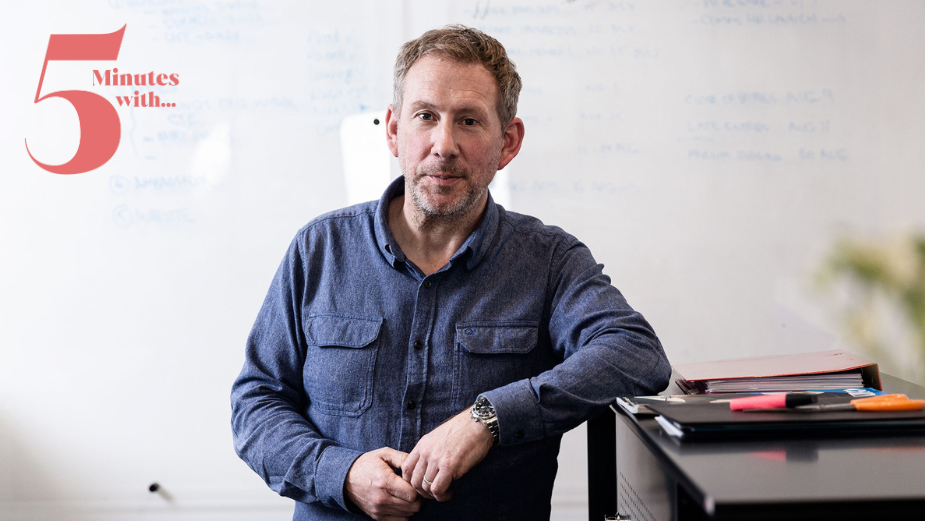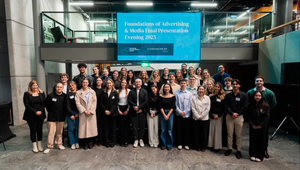
5 Minutes with ... Simon Lendrum

All industries evolve and change, often due to technological innovations, sometimes due to people. Sometimes however, the more things change the more they stay the same. After moving around the world two decades ago, Simon Lendrum curiously finds himself in the same place; by the sea.
Having worked at the best creative agencies in the world, Simon, CEO of the Commercial Communications Council, now lives in Auckland – which he affectionately dubs, “one of the best places in the world for advertising careers.”
Speaking to LBB’s Adam Bennett, Simon opens up about change and its many opportunities, how creativity is still central to advertising, and why his work at Commercial Communications Council helps to uplift the local industry.
LBB> Simon, thanks for taking the time to speak with us. Let’s start at the very beginning - what kind of a kid were you growing up, and at what point did you know that a career in this industry would be right for you?
Simon> It’s too long ago to remember accurately. I was probably quite a confident kid, in most areas, then a moody one as the hormones kicked in. But I didn’t even know this industry existed until my final year of University when I started to see my mates getting jobs. I went to the careers office in a bit of a panic. Then, amongst all the box files on industries I found one with a VHS tape of ads from Abbott Mead Vickars. There were some great ads on there – Volvo ‘twister’, Dunlop’s ‘Tested for the Unexpected’. It looked far more interesting than anything else on the shelf. Still does.
LBB> You were born in the UK before making the move over to NZ. What is it about New Zealand that’s kept you around all this time?
Simon> London’s great in your twenties. When I hit thirty it started to not add up for my family and I. We landed in Auckland and suddenly our son had freedom that he couldn’t possibly have in London, and it all made sense. I grew up by the sea. Now I’m back by the sea, I go diving regularly, I get a boat to work. And New Zealand is one of the best places in the world for advertising careers. Besides, I’ve been here twenty years now so there’s no going back!
LBB> What are the biggest ways in which today’s industry is different from the one you first entered?
Simon> Well, there’s the obvious things. I mentioned VHS tapes earlier on. Channels have changed, consumers have changed, the pace of delivery has changed. So too has the nature of the client-agency relationship. Financial pressure has changed everything. Budgets probably haven’t changed significantly in 30 years, but the demands on those budgets are immense now. With the expansion of channels, the necessity to develop expertise in all areas means the same budgets need to feed many more mouths.
Frankly, what it has also done is accelerate the sense of short-termism. Because we can now produce things at a thousand miles an hour we do. The structure of communications in the nineties meant that you built campaigns to last. It’s been an vicious cycle ever since; more channels to try, so we spread things too thin, then results suffer, so we think that advertising doesn’t work anymore, so we are quick to throw things out and do something else, and the results suffer, and so on. The challenge of returning to the principles that held when I joined the industry (brand building, the long and the short of it, etc) have been held up by those who preach it risking dismissal as luddites or out-of-date thinkers. I think they’re quite the opposite.
LBB> And, on the flip side of that, in what ways (if any!) has the industry remained the same?
Simon> Creativity still reigns. Our industry isn’t rocket science. Advertising makes people aware of brands and slightly more likely to consider them when they’re in the market for those specific products or services (salience, in old language). Good advertising has to stand out from everything around it. To do so it needs to be distinctive, relevant, and consistent. Creativity delivers this. It also means that good work will feel risky because it’s not like everything else. So what hasn’t changed one bit is that behind every great piece of work is a great client who has somehow protected the idea from everyone who finds comfort in the familiar.
LBB> In your role as CEO of the Commercial Communications Council, you champion the value that the creative industry delivers for brands. So, with apologies for putting you on the spot, how would you articulate the value of creativity for a brand looking to cut through?
Simon> It’s an extension of the thoughts above. Creativity is the art of conveying a message in a way that will be distinct from the competition, relevant to the audience and motivating. Creativity makes you take notice. I think we’re understanding far more about the innate power of storytelling as a means to convey meaning in a way that sticks. Without creativity, brands might gain some initial traction from the low-hanging fruit of audiences already looking for what that brand offers. But the long-term outlook will be bleak. Creativity provides brands with the chance to build future audiences and linger in the memory of those who brands rely on for longevity.
LBB> How does the CCC work on behalf of its members, what is your remit in championing both the agency and production communities in NZ?
Simon>We exist to lift the reputation, influence and impact of the industry. We provide advocacy, celebrate great work by running five major awards shows, provide training and development, entry-level recruitment, and we’re working hard to fix the problem that I experienced as a student and still exists today; unless you’ve already got friends or family in the industry, you likely don’t know it exists and don’t know the breadth of career opportunities within it.
We’ll also be putting huge emphasis this year on launching a carbon reduction scheme across the whole industry, bringing agencies, production companies, media owners and clients together in a common cause to ensure our industry becomes more carbon efficient and sustainable for decades to come.
LBB> New Zealand consistently over indexes on its commercial creativity, what is it in the air that creates such globally consistent work?
Simon> Lots of people have tried to put their finger on it. My best guess is two conditions specific to New Zealand. Firstly, there’s just fewer layers on both agency and client side. Great ideas have, in general, a shorter journey to navigate. There are fewer voices to say ‘no’. The other condition that is often attributed to New Zealanders is our willingness to give it a go. There’s a no-nonsense sensibility that lends itself well to just getting on with it.
LBB> “It’s never been harder for a brand to break through and be remembered than it is today”. To what extent do you agree with that statement?
Simon> 100%. Just look at FMCG. What was once the preserve of classic marketing and marketers is slave, more than ever, to the challenges of distribution. So much effort is put into demonstrating support instore and through trade marketing, just to get the product on the shelf, that the art of generating consumer demand for that product is often secondary. And the dominance of tech brands in our lives makes it harder for every other category to get a look in.
LBB> You’re also an author, and recently won the NZ Booklovers Best Fiction Award for your debut novel! Has your career as a writer influenced the way you see the creative industries in your day-to-day work?
Simon> Writing is my way of staying sane. It’s quite separate from my work in advertising. It’s hard not to draw some parallels though. I can’t talk about my own book nearly as well as my publisher can. Yet it’s become the norm for creatives to not only develop the idea, but to be the one to present it as well. Don’t get me wrong, some creatives are natural born presenters. But not all. I think the role of account management has diminished in this transition. Get suits back to selling the work, I suppose I am saying.
LBB> And where do you find your own creative inspiration?
Simon> Everywhere. But always from other humans. The beauty of our industry is we get to be inspired by our colleagues so regularly we take it for granted. I’m constantly in awe of those around me who solve gnarly problems with simplicity, articulate themselves in ways that I could only dream of, and work together as a team intuitively in a way that no process diagram could ever deliver.
LBB> Finally, imagine you had a time machine and the ability to go back and give your past self one piece of advice. What would you say, and why?
Simon> Just because you’ve earned it, doesn’t mean you need to spend it.












